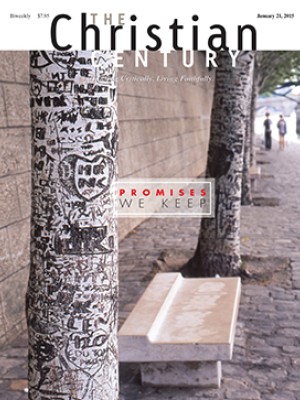Sunday, February 1, 2015: Deuteronomy 18:15-20
Idolatry seems like such an easy thing to avoid.
In the unfolding drama that is God’s love for creation, I am repeatedly reminded of how distorted my sight is. Idolatry seems like such an easy thing to avoid. No wooden statues on the mantel, no lockets with Zeus pictured within.
But it’s never that easy, is it? Idolatry isn’t solely a matter of the artifacts that fill our lives. More often idolatries are the ways our lives coalesce, imperceptibly, around the “invisible unholy.” Idolatry’s normalcy becomes a comfort, and this comfort is taken for nature. After centuries of this—the deaths of dark bodies in the next town, the wailing of Afghani faces covered in the rubble and dust of a drone’s missile, the news of settlements built upon the crushed homes of dispossessed land—these realities seem not only inconsequential but almost necessary. We hurry to believe the justification of death before we even mourn the dead.
Prophets are inconvenient reminders of our everyday idolatries and how they have hardened to become structures of death. As the children of Israel enter a new land, they desire a prophet. What are they hoping for? Do they know what they are asking for?
Read our latest issue or browse back issues.
In the midst of entering a new land, of setting feet into promise, we are always faced with promise and peril. Deuteronomy draws us into Israel’s preparation for life in lands of liberation. With the chains of Egypt behind them, they anticipate life in a new land—a land that signifies their covenant with God. Though Moses will not join them, the promise of a prophet like him enjoins Israel to resist the idolatries of the land. Their lives are to be unequivocally devoted to God, molding their lives and beings into God’s purposes in this new land. The priest will teach and call—yet the people will find themselves in bondage to the land, to the ideas and dependencies of their carved gods and their worship of fellow creatures.
“God will raise up a prophet like me from among your own people,” says Moses. In the face of these realities God will send a prophet like Moses—one whose life miraculously points to God’s calling, to God’s plucking out of death and setting upon firm ground. But this prophet will come from among “your own people.” This prophet will not be a stranger with a new perspective or one with expertise that does not already reside within the community. “Your own people” suggests a more difficult prophet to hear—one who is familiar, who is known, who sees us in our daily lives and who is perhaps easy to ignore because we see her or him every day, too. Or at least we think we do.
This prophet will speak to us in God’s words, words that cut deep because they are folded within the days that we have shared. The prophet sees how we eat, and who eats with whom. The prophet sees who is made to fetch water by themselves and whose stomachs churn with hunger while others eat their fill and toss extra to goats and sheep. Called from within a people, the prophet will speak to us of idolatry—not in the abstractions of belief and worship, but in the grounded realities of my neighbor’s field and the foreigner’s family. The prophet will point out my unfaithfulness in the patterns of my day and the ordering of our villages and towns and cities.
And we will resist her by calling her crazed or too radical or too emotional. We will resist because if we can’t dismiss her, then too much has to change in our lives. If she is right, we will have to take the idols out from beneath our fine clothes and our beautiful homes and stable lives. We will have to discover that they are dry sand, creations of our own making.
But the prophet is never, herself or himself, the pinnacle of sight or the ideal of what God demands. She speaks as one called—as a vessel through whom God speaks even as the speaker struggles to discern the meaning of her own words. To speak a word that has not been commanded is to have faith in ourselves as speakers rather than in the God who speaks through us. The prophet stands in between. Drawn out of her own people to speak words that are not hers, she can never truly return to the people she had called hers. Like Moses, she leads a people into a land she may not enter. She sows so that God will reap.
God has given us prophets from our own people. How do we receive them? Do we name them too crazy, too radical? Do they press us with a truth that cuts too deep? Or will we hear them—receiving the words of those whose lives display the courage and risk to lead others to a place they themselves will not know? Will we face our own idolatries and betrayals?






